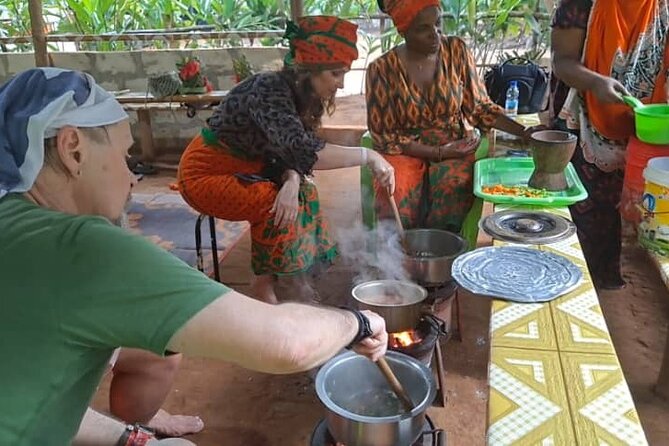Can a single island blend Indian, Arab, Persian, and African culinary traditions into something truly unique? In Zanzibar, this fusion is more than just a theory—it’s a delicious reality. Here, local cooking classes aren’t merely an activity, but an immersive journey into the heart of the island’s rich gastronomic culture.
Originating from a history steeped in spice trade, Zanzibari cuisine is a testament to the island’s diverse influences. Each cooking class offers not just recipes but also stories, bringing the historical significance of each dish to life. It’s fascinating to learn that 80% of the world’s cloves come from Zanzibar, undeniably adding authenticity to the flavorful experience.

Exploring Zanzibar’s Gastronomic Heritage through Local Cooking Classes
In Zanzibar, culinary traditions span centuries, reflecting the island’s rich history. These cooking classes offer a unique opportunity to dive into this heritage. Participants not only learn to cook traditional dishes but also gain insights into the island’s cultural influences. This hands-on experience often includes using age-old techniques and local ingredients. It’s a holistic way to understand Zanzibar’s culinary story.
One fascinating aspect is how the island’s spice trade has shaped its kitchen practices. Cooking classes highlight the use of cloves, nutmeg, and cinnamon, which are key in Zanzibari cuisine. These spices give an aromatic depth to the dishes. Students learn how these flavors are integrated into both simple and complex recipes. The result is a mouth-watering experience that stimulates the senses.
In addition to spices, fresh local produce plays a vital role. Ingredients like coconut milk, fresh fish, and tropical fruits are staples in many recipes. Cooking classes often include a trip to local markets, providing an immersive experience. This not only supports local farmers but also allows participants to select the freshest ingredients themselves. It’s an essential part of the learning process.
Moreover, these classes are a gateway to understanding the social aspect of food in Zanzibar. Preparing meals is often a communal activity, bringing people together. Participants can bond over shared tasks and stories passed down through generations. These classes foster a sense of community and appreciation for Zanzibar’s culinary traditions. By the end, students not only have new cooking skills but also a profound connection to Zanzibari culture.
The Best Food Tour in Zanzibar, Tanzania (Full video)
Historical Influence in Zanzibar’s Cuisine
Zanzibar’s cuisine is a vibrant tapestry of flavors from various cultures. The island’s location made it a key stop on trade routes, introducing a mix of culinary traditions. Arabs, Indians, and Europeans all left their marks on local food. Consequently, dishes often feature a blend of spices and cooking techniques from these regions. This mix has become a defining aspect of Zanzibari cuisine.
Spices play a crucial role in this culinary narrative. The spice trade thrived in Zanzibar, with products like cloves becoming synonymous with the island. These spices were brought by traders and became integral to everyday cooking. They not only add flavor but also tell the tale of the island’s historical exchanges. According to this expert opinion, the influence of these spices extends beyond the kitchen, shaping the cultural identity of Zanzibar.
Another significant influence comes from Indian cuisine. Curries and pilafs are common, reflecting the strong Indian presence on the island. Both use rice as a staple, enriched with spices like turmeric and cumin. These dishes highlight the island’s ability to absorb and adapt culinary traditions. This fusion is a testament to Zanzibar’s diverse past.
European colonizers also contributed to Zanzibari food. Vanilla, introduced by the French, has become a popular ingredient in local desserts. This inclusion adds a unique twist to sweet treats. Thus, every dish in Zanzibar is a connection to its layered history, promising a flavorful journey for its culinary explorers. The enduring influence of these historical interactions continues to shape the island’s enticing cuisine.
The Art of Cooking Traditional Zanzibar Dishes
Cooking traditional Zanzibari dishes is like painting with flavors. These recipes combine local ingredients with spices that bring out the soul of the island. For instance, coconut milk often serves as a creamy base. Mixed with cloves, cinnamon, and cardamom, it creates a rich, aromatic taste. These elements truly showcase Zanzibari culinary expertise.
The basics of a traditional dish often include using fresh seafood since Zanzibar is surrounded by the Indian Ocean. Fish, prawns, and octopuses are commonly used and are prepared with a unique Zanzibari twist. Techniques such as grilling and simmering in spiced coconut broth enhance the natural flavors. The result is a dish that is both savory and aromatic. Here, the ocean directly contributes to daily meals.
Rices like pilau and biryani hold a special place in Zanzibari cuisine due to their layered preparation process. Each grain is carefully spiced and infused with flavors that reveal the island’s cultural diversity. A table might display the intricate balance of spices, such as saffron and coriander, used in these rice dishes:
| Spice | Role |
|---|---|
| Saffron | Adds color and fragrance |
| Coriander | Provides citrus undertones |
Learning to cook these dishes isn’t just about following a recipe; it’s about understanding the island’s heart. These meals represent community and tradition, often shared during family gatherings or local celebrations. Cooking classes allow outsiders to experience the techniques and emotions behind each dish. It’s not just about nourishing the body but also the spirit, embracing the warmth of Zanzibar’s hospitality.
Flavours of Zanzibar: Spices That Define the Island’s Cuisine
Zanzibar, often called the Spice Island, offers a variety of flavors through its wonderful spices. These spices are key to the island’s culinary magic and have been traded for centuries. Among them, cloves hold a special place, both in history and in food. These small, fragrant buds add a sweet and spicy touch to many dishes. The unique aroma of cloves is unmistakably Zanzibari.
Cardamom is another treasure in Zanzibari kitchens, adding warmth and complexity to recipes. This spice is especially favored in rice dishes and desserts. Its flavor, a blend of sweetness and spice, elevates simple meals to something extraordinary. It’s often combined with cinnamon, which brings a comforting fragrance and enhances the overall flavor. Together, these spices define the taste profiles of many local dishes.
Black pepper, known for its sharp and pungent taste, is yet another essential spice in traditional Zanzibari cuisine. Its bold flavor contrasts and complements the sweetness of other spices, creating a balanced dish. Fish and meat dishes frequently feature this spice, giving them a savory bite. This mix of spices highlights the island’s mastery in balancing flavors.
Besides cooking, these spices have uses that extend beyond the kitchen. They play a significant role in traditional remedies and fragrances. Spices such as cloves and cinnamon are often used in health and beauty products. This multi-purpose nature of spices showcases their versatility. It further solidifies their importance in everyday Zanzibari life.
The blend of spices creates an explosion of flavors that makes Zanzibari cuisine a delight to explore. Cooking classes on the island often emphasize these essential spices, teaching how to unlock their full potential. This learning experience deepens the appreciation for the island’s rich culinary heritage. Both locals and tourists find joy in the spices that define Zanzibar. They serve as both a cultural symbol and a sensory journey.
Experience the Cultural Exchange via Zanzibar’s Cooking Classes
Joining a cooking class in Zanzibar is more than just about learning recipes. It’s about diving into a rich tapestry of culture and history. Participants interact with local chefs, learning traditional techniques and stories. These experiences create a bridge between travelers and locals. It’s an opportunity to connect through the universal language of food.
The cooking classes often start with a visit to vibrant local markets. Here, participants select fresh, local ingredients guided by their instructors. This shopping trip provides a glimpse into daily life on the island. It’s the ideal way to experience Zanzibari culture firsthand. The bustling atmosphere is full of sounds, colors, and smells.
After gathering ingredients, the real culinary adventure begins. Instructors guide participants through the preparation and cooking process. Traditional dishes like pilau or octopus curry come to life during these sessions. The hands-on experience is not just instructive but also deeply engaging. It showcases the blend of simplicity and complexity found in Zanzibari cuisine.
Cooking classes also foster a sense of community among participants. Sharing the meal after cooking is a celebration of new friendships. It’s an opportunity to savor the fruits of your labor while reflecting on the experience. This communal dining is integral to the Zanzibari way of life. For many, it’s the highlight of their culinary journey on the island.
These classes leave a lasting impression, extending beyond cooking skills. They offer a window into a world where culture, history, and food intertwine. As participants return home, they carry with them more than just recipes—they bring stories and memories. This cultural exchange enriches both visitors and locals alike. Zanzibar’s cooking classes are truly an adventure for the senses.
Key Takeaways
- Cooking classes reveal Zanzibari culture through traditional recipes.
- Local spices like cloves and cardamom are essential in classes.
- You learn by engaging with local chefs and their stories.
- The market visits are a vivid part of the culinary journey.
- Cultural exchange is central to the Zanzibar cooking experience.




